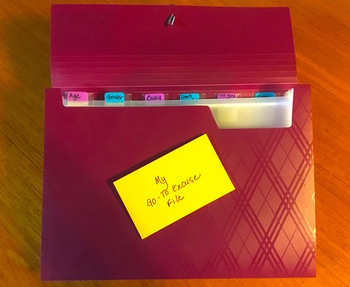One of my bright, middle-aged, and very perceptive university students shocked me a while back when she didn't turn in a paper by the due date. When I inquired about the delay, she said, "I've always been an academic procrastinator." My response was, "That is your history. That behavior can change now." Quite shortly thereafter, she turned in a thoughtful paper. Acknowledging receipt, I wrote, "The next time you take a class, set the intention from the start that all your papers will be turned in on time. Remember, you are not your history."
As I live in discovery, I'm finding that changes in behavior can happen at any time. One approach that's helped has been to learn what beliefs might lead me to try to justify why I might decide "I can't." Identifying and becoming familiar with what I now call my Go-To-Excuse File is key to better understanding my reactions to challenges and change. This file is my personal bank of wonky excuses that pop up instantly and automatically when I feel fearful or uncertain.
My reasons for not doing something can arise so quickly that I don't even hear the trapdoor in my mind snap shut. These excuses might sound like this:
I can't because
- I tried it once and it wasn't for me
- I don't know how to do that because I haven't tried it
- I'm not good at that
- I'm too busy
- I'm too old for that
- I'm too tired
Delivering one of these excuses is usually an Oscar-worthy performance that I have practiced for a long time. It's a form of being wonky that I'm good at, and I can be very convincing. Others frequently agree with me, or pretend to agree with me, because I present these thoughts in a very rational way. Believe me, we are all REALLY GOOD at many of our wonky performances.
One of my favorite excuses is, "I tried it once and it wasn't for me." If I'm honest with myself, how many things are easy and familiar on the first try? Am I willing to be vulnerable and learn? Am I willing to be seen as vulnerable and to learn in front of others? Am I willing to be uncomfortable when I'm unsure of myself or of how to do something new?
The Go-To-Excuse File is always readily available to supply me with an immediate response. Clinging to what my wonky Champion holds dear, it confines me to the limits of my current self and resists expansion and growth. I've found that truly identifying all of my wonky excuses is especially important so that I will recognize them as wonky when they come up.
I know, for instance, that I'm capable of faking others out by using an excuse that is seen as socially acceptable, such as doing anything that involves service to others. In other words, if service to others can get me off the hook of taking responsibility for myself, I will likely use this as my reason for choosing not to do something that makes me uncomfortable. When one of these ideas comes to mind, such as "I'm too busy," I've learned to ask, "Is that really true?" Frequently the answer is no. This question allows me to give thoughtful consideration to what I have established as a wonky pattern.
Personal trainers have a mantra: Change creates change. So, regardless of our personal histories, each time we choose to change a behavior, it creates an opening within us to make other changes. To grow and expand in this way is the essence of living in discovery.
This blog is the second in the series "Harnessing the Full Power of the Mind." This series explores some of the tools and strategies featured in our forthcoming book, The Art of Living in Discovery: Thriving in Life with Intentional Resilience. Designed to help you to take responsibility for your mind, the blogs offer a variety of ways to become more aware of how your mind functions and how to identify when your mind is wonky. As you play with and practice these ideas, you will find that you can bring your mind back to an inspired state and into balance.
